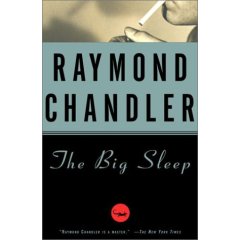
# Paperback: 234 pages
# Publisher: Vintage; Reprint edition, 1988
# Price: $12.95
# ISBN: 0394758285
I'm no fan of mysteries, except perhaps the general mystery surrounding life, and I see crime enough in the every day without feeling the need to return to it for entertainment, and I'm not at all a fan of the hard-boiled detective with his hard-to-stomach arrogance (and what an apt adjective, this "hard-boiled," the golden yolk turned gray and flavorless when held over the flame too long). But I'm always a fan of a well written book, no matter what the genre. And Chandler's book qualifies.
It intrigued me to read this, one of the classic firsts, literary birthing grounds for the nearly, by now, cliche persona (Dashiell Hammett's Sam Spade being perhaps the very first, followed closely by Chandler's Phillip Marlowe, then variations on a theme with Mickey Spillane's Mike Hammer, Ross MacDonald's Lew Archer, and a long string of others, the most recent contemporary rendering of which I've come across being the character of Joe January in J. Conrad Guest's January's Paradigm.). Humphrey Bogart brought several of these to the silver screen, and the character, by whatever name, is now so well known that we can all imitate him at a drop of a fedora, cigarette hanging loose in the corner of our mouths, gal Friday awaiting our command.
As usual, the persona is done arguably best by its inventors. And, as usual, the book has added linguistic pleasures surpassing the cheapened Hollywood screen versions (for example, I noted that the book version of Marlowe isn't nearly the womanizer that Bogart's film version is as he romances Lauren Bacall, a romance that never really happens on the written page, and in his literary version, he even exhibits ethics in the bedroom that any woman can cheer). We get the language -- hard, crisp, fresh, even today. Chandler's spare style might even at moments find comparison in Hemingway. His metaphors delight.
"Dead men are heavier than broken hearts."
"The minutes passed on tiptoe... The light hit pencils of rain and made silver wires of them."
"He had tight brilliant eyes that wanted to look hard, and looked hard as oysters on the half shell."
"The gentle-eyed, horse-faced maid let me into the long gray and white upstairs sitting room with the ivory drapes tumbled extravagantly on the floor and the white carpet from wall to wall. A screen star's boudoir, a place of charm and seduction, artificial as a wooden leg."
Hey, now that's fine writing. It hits the mark with no side trips. I may change my mind about the hard-boiled detective, especially in his softer-boiled moments.
No comments:
Post a Comment